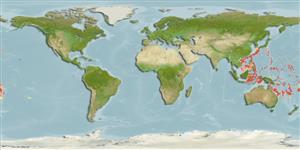>
Zeiformes (Dories) >
Grammicolepididae (Grammicolepidids) > Macrurocyttinae
Etymology: Macrurocyttus: Greek, makros = great + Greek, kyttaros, kytos = a convex cavity.
More on author: Fowler.
Environment: milieu / climate zone / depth range / distribution range
Οικολογία
Θαλασσινό(ά) βαθύβιο(ς); εύρος βάθους ? - 878 m (Ref. 40966). Deep-water
Western Central Pacific: Philippines (Ref. 40966) and Australia (Ref. 75154).
Μέγεθος / Βάρος / Age
Maturity: Lm ? range ? - ? cm
Found on the continental slope (Ref. 75154). Minimum depth from Ref. 58018.
Life cycle and mating behavior
Γεννητική Ωρίμανση | Αναπαραγωγή | Γεννοβολία | Αβγά | Γονιμότητα | Προνύμφες
Heemstra, P.C., 1999. Macrurocyttidae. Dwarf dories. p. 2258. In K.E. Carpenter and V.H. Niem (eds.) FAO species identification guide for fishery purposes. The living marine resources of the Western Central Pacific. Volume 4. Bony fishes part 2 (Mugilidae to Carangidae). FAO, Rome. (Ref. 40499)
IUCN Red List Status (Ref. 130435: Version 2024-2)
Threat to humans
Harmless
Human uses
αλιεία: χωρίς ενδιαφέρον
Εργαλεία
Special reports
Download XML
Διαδικτυακές πηγές
Estimates based on models
Preferred temperature (Ref.
123201): 8.1 - 17.2, mean 12.9 °C (based on 84 cells).
Phylogenetic diversity index (Ref.
82804): PD
50 = 1.1250 [Uniqueness, from 0.5 = low to 2.0 = high].
Bayesian length-weight: a=0.01995 (0.00906 - 0.04395), b=3.01 (2.83 - 3.19), in cm total length, based on all LWR estimates for this body shape (Ref.
93245).
Τροφικό Επίπεδο (Ref.
69278): 3.8 ±0.8 se; based on size and trophs of closest relatives
Fishing Vulnerability (Ref.
59153): Low to moderate vulnerability (31 of 100).
